Underground Warsaw throughout almost the entire occupation was looking for an opportunity for revenge, carrying out attacks on individual officers of the terror apparatus or even entire groups of them. However, the chance of real retaliation for the victims of Szuch and Pawiak came only with the beginning of the Warsaw Uprising.
The first hours of the fighting were marked by chaos, but also enthusiasm, which gripped both soldiers and civilians. It was thanks to him that barricades sprang up rapidly in the streets. Volunteers came to the units, and prisoner-of-war camps were established in various parts of the city, despite organizational problems. For example, the first and the largest of them was in Śródmieście, near the place where the Uprising commander, Col. Antoni Chruściel "Monter".
An eye for an eye… execution for executions
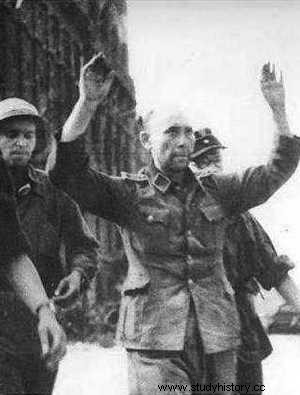
The SS-Sturmscharführ, captured in the PAST building, certainly could not count on the pity of the insurgents.
The orders issued by him in the first half of August rearranged the rules of dealing with detainees. Among the three groups listed in the documents, the worst was foreseen for the second, which included SS men, Gestapo men or harmful Volksdeutsche. In theory, they were handed over to Special Military Courts. In reality, however, one sentence was assigned to them - death.
From the very beginning of the fighting, Wola in Warsaw became the arena of dramatic events. The Nazis spent the civilian population in courtyards, factory squares, barracks and churches, where the victims were shot and burned. The wounded and the sick were murdered in hospitals. No one was spared. The fumes of burning buildings were more and more mixed with those hovering over the heaps of charred corpses.
The feeling of helplessness grew on the Polish side. Soldiers observing the Dantesque scenes from their stands, sometimes happening only a few dozen meters away, felt the need for revenge more and more clearly.
On August 4, one of the patrols of the "Czata 49" battalion captured, according to his soldier and historian, Romuald Śreniawa-Szypiowski, 6 Volksdeutsche (including 1 woman and 1 boy) caught in the act of setting fire to houses .

It is very likely that these Volksdeutsche and collaborators also ended up in front of the firing squad.
It is not known whether they were put on trial. Even so, there could be only one decision as to their fate. They did not hide it [what they did], threatening that if you did something to them, they would be avenged by their people . This announcement of repression made no impression on anyone. Perhaps it even strengthened the emotions so far.
One of the battalion officers selected six soldiers. The prisoners with their hands tied were placed against the wall, nomen omen, of the cemetery. The order is given:"aim". A moment of silence, the firing squad looks at the inmates. "Fire!" . The boom of the gunshot, the bodies fall to the ground.
Because there must be order
In the first half of August, the command of the Uprising received a report on the situation in the society:
Passivity and frightening the Germans in the first days of the uprising, as well as widespread enthusiasm - initially softened the hostile mood towards the Germans. Then, however, activity, repression and murder awakened old feelings:fear and hatred, expressed in determination. The general reaction is with heightened hatred and fierceness, and a desire to retaliate. (...) Against the gendarmerie, the Gestapo and the Ukrainians - hatred and the desire to eliminate immediately. Usually, Ukrainians are treated ruthlessly, accusing them of treason and subversion .
Despite such sentiments, the executions were carried out in a surprisingly orderly manner. Court, judgment and enforcement. Were it not for the background of these events, one could say: ordnung muss sein .
German POWs by the wall
Sometimes, however, there were spontaneous shootings. On September 6, when Powiśle was raining, Zbigniew Blichewicz "Szczerba", whose unit was to withdraw as one of the last ones, suddenly heard shots. They came from the area that should still be occupied by the insurgents. He decided to check it out. There he saw a garden with:
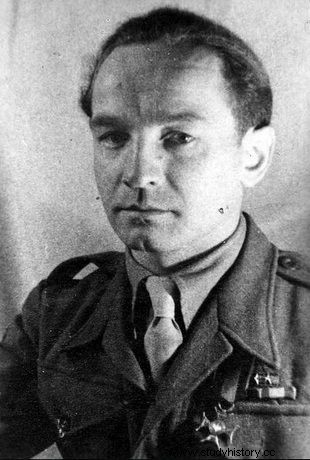
In the memoirs of Zbigniew Blichewicz "Szczerba" there is an account of the execution of the Volksdeutsche.
a hut with a dozen or so people in the background. A large group of people of both sexes is watching it next door. Men predominate. Several Home Army soldiers are hovering in front of the people standing against the wall of the barracks and every now and then one of them shoots at those standing motionless .
Shots were fired one at a time. One by one the bodies fell to the ground. It gave the impression of some macabre improvised fun ad hoc.
Blichewicz, shocked for a few moments, stared at the entire scene. When he finally asked what it was all about, he heard: We're killing the Volksdeans! It turned out that they came from the local camp. When some of the prisoners escaped from it, the rest were decided to be killed so that they would not return to their own .
Not knowing what to do with this story, "Szczerba" went to his commander, who ordered him to "make order". Reluctant, for he thought his people shouldn't be fulfilling such tasks, he returned to his place.
This article has more than one page. Please select another one below to continue reading.Attention! You are not on the first page of the article. If you want to read from the beginning click here.
Do you deserve to live?
There the "macabre fun" continued. Blichewicz screamed: Stop! Cease fire . Now in the spotlight of everyone present, he ordered the weapons to be lowered, then looked at the condemned. Everyone was looking at me - he recalled - in a way I cannot describe. There was everything in their eyes:animal fear, hope, question and shout, plea and fear again .
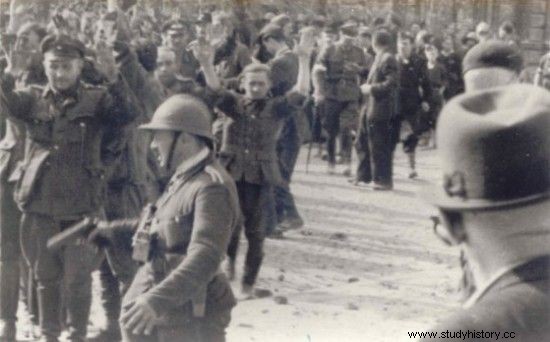
German soldiers taken prisoner after capturing PAST. In contrast to the SS and Gestapo soldiers, Wehrmacht soldiers could count on good treatment.
He asked one of the people standing against the wall who he was. The other replied that a pyrotechnician who had only recently arrived in the General Government and had never been in the army and party. He believed that due to his profession it can be useful to Poles.
"Szczerba" decided to subject him to a test, the result of which was to determine the life of this man: Are you, as a German, even if not in a uniform ... Do you have the right to live ?! The other, resigned, shook his head silently. And thanks to that he survived.
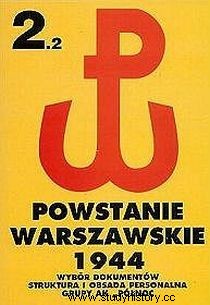
His savior ordered him to step back, and then turned to one of the soldiers who had already been executing:
All folks to the ground! Germans who are native and only those who can be of use to us, leave them. The rest of the bodies are to be thrown into the barracks, poured with kerosene and burned! Make sure everything burns out well! So as not to leave any traces!
He made several of his men responsible for carrying out the order. When Blichewicz was leaving the scene, he did not hear the shots, I sensed, however, that someone was following me. My German followed me quietly and meekly. As I looked back, I met his doggy grateful eyes. He also did not step away from me .
After a few hours, the soldiers of "Szczerba" returned, reporting the execution of the order.
Bloody revenge of the insurgents?
In the middle of the month, Blichewicz once again encountered his pyrotechnician. Together with several other prisoners, he dealt with the disarming of misfires. Dangerous role, but with a chance of survival.
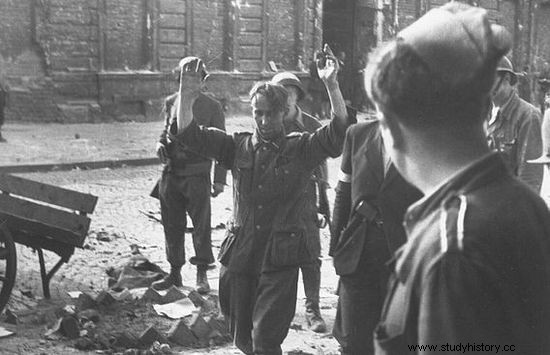
These prisoners are probably safe as well. Unless they happen to be killed by German bombs.
Apart from SS men, Gestapo men or "harmful Volksdeutsche", whose fate usually became a doomed when they fell into Polish hands, the majority of German prisoners of war could not complain about their fate. Well treated, under medical care, getting food rations like everyone else.
The desire to retaliate in Polish society did not translate into mass repressions against prisoners. The individual cases known from the sources rather show an orderly and fair approach to the matter. Because the Warsaw Uprising, as Janusz Marszalec, a historian wrote, is not a history of bloody revenge .
Editor:Krzysztof Chaba; Photo edition:Rafał Kuzak
